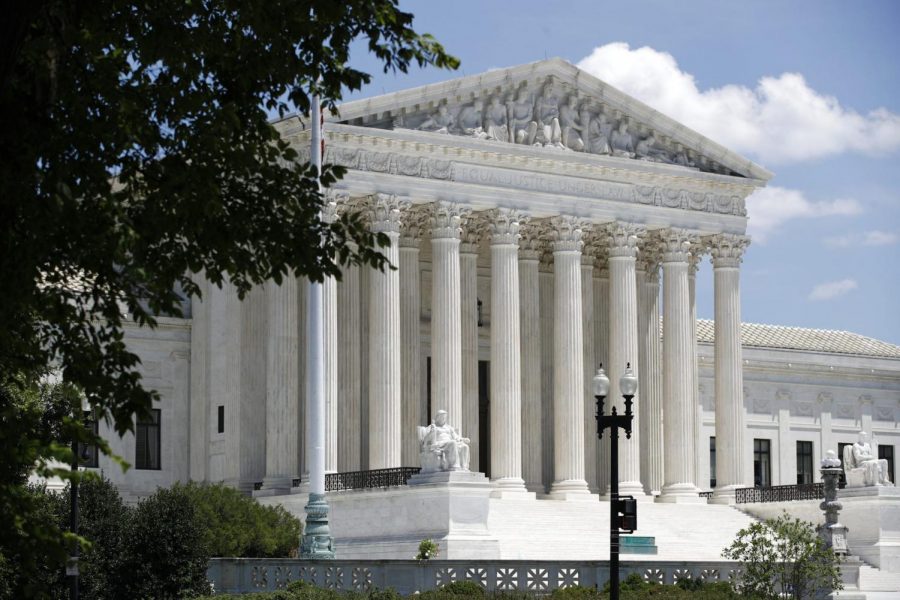In this June 29, 2020 file photo, the Supreme Court is seen on Capitol Hill in Washington. (AP Photo/Patrick Semansky)
Women anxiously await the Supreme Court ruling on a Texas abortion case next year due to the possibility of the case upsetting the Roe v. Wade precedent.
The Supreme Court is set to hear a Texas abortion case that currently bans abortions after six weeks of pregnancy and lets random parties sue abortion providers, according to Women’s March. If ruling in favor of Texas, it could affect the precedent Roe v. Wade has set for women’s reproductive rights for the past 50 years.
The 1973 Roe v. Wade ruling legalized a pregnant woman’s right to abortion without excessive government intervention. Abortion rights vary depending on state laws despite Roe v. Wade. Mississppi passed a law that would ban abortions after a 15-week period, according to Women’s March. Fifty-eight percent of U.S. women still live in states with restrictive abortion laws, according to Guttmacher Institue.
“The discourse around that is the quote unquote ‘pro-life’ discourse completely negates the rights of the woman to determine what happens to her own body, in the case of pregnancy,” said Elissa Foster, a health communications professor at DePaul.
Kaitlyn Shelley, a biology major at DePaul, pointed out how a majority of the abortion legislation made comes from men.
“It is absolutely ironic that men come up with almost every bill proposed that attempts to overturn Roe v. Wade and women have no input over decisions about their own body,” she said. “However, this is partially due to the disproportionate representation of women in government.”
Although the preconceived notion is that young girls ages 15-19 receive the majority of abortions, Guttmacher Institue reported that 59 percent of women who receive abortions are already mothers.
“Women’s sexuality, if not valued, is exploited,” Foster said. “Men’s sexuality is upheld as the be all and end all but women’s sexuality is feared, exploited and diminished. So that’s why this whole idea of promiscuity comes into play.”
Pro-choice movements emphasize that Texas’ current six-week ban is too short for women to discover they’re pregnant and decide to terminate it. Foster said that menstrual cycle timing is crucial in these cases.
“[This is under the assumption that] women have regular menstrual cycles, which is not true for everybody,” Foster said. “Menstrual cycles can be anywhere from 15 to 35 days, you could easily have many cycles that are six weeks long without there being pregnancy involved.”
Along with abortions, contraceptives play a role in women’s reproductive rights. Guttmacher Institute reported that 10 states are introducing bills to expand access to emergency contraception. However, emergency contraceptives are not fully accessible in all states.
If overturned, there would be little- to- no barriers between the government and child-bearing women to legalize safe abortions. In the larger scheme of reproductive rights, contraceptives, Planned Parenthood and emergency services could be federally defunded.
“I use contraceptives to lessen the symptoms of my menstrual cycle,” Shelley said. “By losing access to this resource, I would experience extreme period symptoms and it would take an extreme toll on my physical and mental health.”
“The men making these laws fail to see the many ways that contraceptives are beneficial for women’s health and refuse to recognize that they do not solely just prevent pregnancy,” she added.
Foster explained that in addition to choosing to terminate the pregnancy for personal reasons, there are other reasons abortions past six weeks should remain legal.
“Around 20 percent of pregnancies, intended or not, result in miscarriage,” she said. “We’re not even talking about the other things that can happen in the course of the pregnancy that lead it to full term but the pregnancy is not viable.”
The pro-life ideology argues that all life should be protected. Most pro-life movements support carrying to term pregnancies even in outstanding circumstances. Many pro-life platforms do not include plans for how to support mothers with unwanted pregnancies after the birth.
“It is just ironic that lobby groups spend so much time and money on this particular question of restricting a woman’s right to determine what is going to happen to her own body and none of the other issues that would matter to childbearing and child rearing women,” Foster said.
The Supreme Court will hear the case in 2022.
"hear" - Google News
June 01, 2021 at 06:06AM
https://ift.tt/3yMqz1r
Supreme Court to hear case that may upset Roe v. Wade - The Depaulia
"hear" - Google News
https://ift.tt/2KTiH6k
https://ift.tt/2Wh3f9n
Bagikan Berita Ini















0 Response to "Supreme Court to hear case that may upset Roe v. Wade - The Depaulia"
Post a Comment